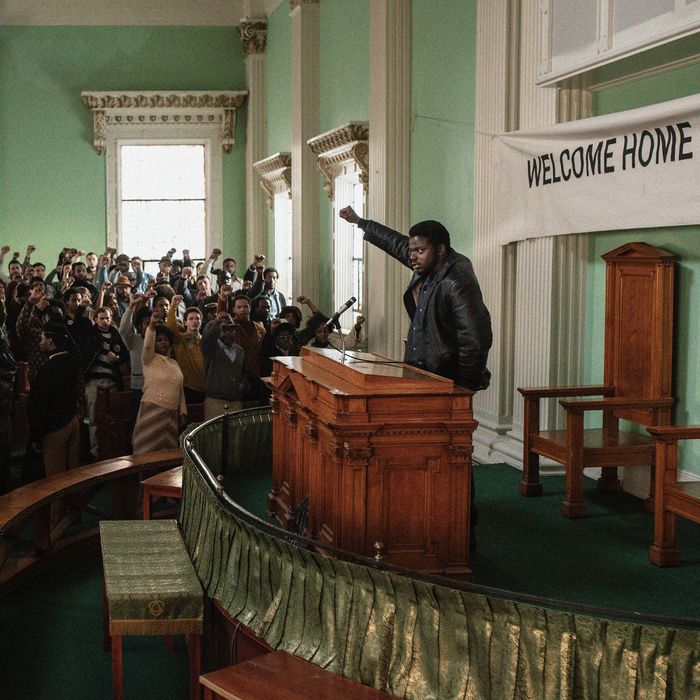
Judas and the Black Messiah has the all the trappings of a genre movie — it’s a gritty crime thriller that unfolds on the tense stage of an anti-police revolution — but it shouldn’t be underestimated as a history lesson. In its true story of how informant William O’Neal (Lakeith Stanfield) infiltrated the Illinois chapter of the Black Panther Party in the late 1960s, director Shaka King’s film highlights historical details and lives that have rarely been given mainstream focus. Along with reckoning with the horrific assassination of party chairman Fred Hampton (Daniel Kaluuya) by Chicago Police, the FBI, and the State’s Attorney’s Office, the film also celebrates Hampton’s power as an orator and man of the people, as well as the impact of his organization on the city of Chicago: the breakfast programs, the free healthcare, the Rainbow Coalition, and more. For every pulse-pounding, fictionalized scene of O’Neal wrestling with his conscience, there’s a quietly moving moment based on a kernel of American history.
To guide you through that history, we’ve compiled a list of the major characters featured in Judas and the Black Messiah, whether they appear on-screen or only in dialogue:
William O’Neal (Lakeith Stanfield)William O’Neal (played by Lakeith Stanfield) became an informant for the FBI around the age of 17, after he was arrested driving a stolen car across state lines. After the saga depicted in Judas and the Black Messiah, he participated in the federal witness protection program in 1973, took on the alias William Hart, and moved to California. He died in 1990 and a medical examiner determined the cause of death was suicide. King’s film is bookended with footage from the documentary Eyes on the Prize, in which O’Neal is interviewed about his participation in the bureau investigation that amounted to the death of Fred Hampton, and how he felt about being both a Black Panther and an informant. A full transcript can be found here.
Fred Hampton (Daniel Kaluuya)Hampton (played by Daniel Kaluuya) was only alive for 21 years, but he lived a full life in that time. In high school he led his school’s Interracial Committee and became active in the NAACP, leading the West Suburban Branch’s Youth Council. Among his work as a budding activist and gifted speaker in his hometown of Maywood, Illinois, Hampton advocated for a community pool; decades later, the town named it after him. The work prepared him for his role as chairman of the Illinois Black Panther Party, and his efforts in creating the Rainbow Coalition, a diverse group comprised of members of the Latinx Young Lords, the white Young Patriots, the Red Guard Party, the American Indian Movement, the Brown Berets, and more, which tackled issues of poverty, anti-racism, corruption, police brutality, and housing in Chicago. The FBI began investigating Hampton in 1967, a year before the bureau recruited O’Neal to infiltrate the Illinois BPP and two years before a raid on Hampton’s apartment resulted in his murder, when the Chicago Police Department opened fire on the chairman and other BPP members sleeping in his home. Before his death, he was expecting a child with fiancee Deborah Johnson (now known as Akua Njeri), who was with Hampton when he was pulled out of bed and fatally shot.
Akua Njeri (Dominique Fishback)Portrayed in the film by Dominique Fishback (pictured above), Akua Njeri (known in the film’s timeline as Deborah Johnson) met future fiance Fred Hampton when she was a student at Chicago’s Wilbur Wright College. True to the deep bond they share in King’s film, their first conversation was about poetry. During her time as a Black Panther, she helped solicit doctors to volunteer their time at the BPP clinics, organized the party’s celebrated free breakfast program, and gathered donations for the community. She and her son Fred Hampton Jr. consulted on Judas and the Black Messiah.
Roy Mitchell (Jesse Plemons)The agent (played by Jesse Plemons, pictured above) who recurits O’Neal as an informant had a real-life extensive history getting intel for the FBI; according to his obituary in the Chicago Tribune, he “specialized in persuading witnesses to talk.” Mitchell had nine informants within the Black Panthers leading up to the assassination of Fred Hampton. Judas and the Black Messiah isn’t the first time that Mitchell has had his work represented in a film — in 1964, he helped solve the murder of three civil rights workers, a case that inspired the movie Mississippi Burning.
J. Edgar Hoover (Martin Sheen)The late FBI director J. Edgar Hoover (played by Martin Sheen in the film) oversaw the forced dismantling of the Black Panther Party by means of a counter intelligence program known as COINTELPRO. The FBI used the program initially in the 1950s to target Communist figures in America, and, as seen in Judas and the Black Messiah, its tactics included monitoring and harassing supposed perpetrators of political dissent. “The Chicago Sun-Times released documents that show Hoover was explicitly involved in the raid to kill Fred Hampton,” Judas and the Black Messiah screenwriters Keith and Kenny Lucas explained to Vulture. “We didn’t even know that. We made some artistic choices to include Hoover in our narrative, and have him conscious and aware of what was happening, but that wasn’t active. We made an assumption and it turned out to be correct.”
Spurgeon “Jake” Winters (Algee Smith)Algee Smith, who plays Black Panther Spurgeon Winters in the film, admits that there isn’t a lot of information available about the man his character is based on. But 19-year-old Winters’ history is an important part of Chicago Black Panther history, as his death during a police shootout (that resulted in the deaths of two officers) undoubtedly inspired Hoover to take more extreme measures. Hampton would be assassinated just weeks later.
George W. Sams (Terayle Hill)George W. Sams (portrayed by Terayle Hill) was convicted of murder during the New Haven Black Panther trials in 1970, pertaining to the kidnapping, torture, and murder of Black Panther Alex Rackley, who was wrongfully suspected of being an informant. Speaking in the trial, the accused Sams claimed that he was acting under the orders of Bobby Seale; but the Panthers believed, as does King’s film, that Sams was the actual informant. A deeper dive into the trial and the case can be found here, courtesy of the New Haven Independent.
Jimmy Palmer (Ashton Sanders)In Judas and the Black Messiah, a character named Jimmy Palmer (played by Ashton Sanders) attempts to stand against police harassment, and then dies suspiciously at a hospital. The character is not based on a real man, but is representative of the various Black Panthers who faced police violence. According to Newsday, 10 Black Panthers were killed by police from April 1968 to Hampton’s assassination on December 4, 1969. (Panther attorney Charles Garry claimed at the time that the police killed 28 members over the course of two years.) Palmer’s fictionalized fate does line up somewhat with the story of slain Black Panther member Larry Roberson, who is not depicted in King’s film.
Jose Cha Cha Jimenez (Nicholas Velez)Early in Judas and the Black Messiah, we get a glimpse of Hampton’s ability to unite people in the form of the Rainbow Coalition. That group included the Young Lords, founded by human rights activist Jose Cha Cha Jimenez (played in the film by Nicholas Velez), to advocate for Puerto Rican and Hispanic communities in Chicago. Speaking about the Rainbow Coalition decades later, he said “The Rainbow Coalition was more than just a gang of activists or folks trying to gain one or two small victories … what we wanted was revolutionary change.”
William “Preacherman” Fesperman (Nick Fink)The Black Panthers found an ally in the anti-capitalist Young Patriots Organization (YPO), a group of white southerners who used Confederate flags and cowboy iconography. This group was part of Hampton’s Rainbow Coalition, and was led by William “Preacherman” Fesperman (played by Nick Fink), who guided the YPO to adopting Black Panther ideas like free breakfast service and healthcare for their community. Black Panther Bobby Lee called Fesperman “one of the best human beings I have ever met.”
Rod Collins (Amari Cheatom)In Judas and the Black Messiah, Rod Collins (Amari Cheatom) is the leader of the Crowns, a fictionalized version of a gang that functions like an amalgamation of groups that joined Hampton’s Rainbow Coalition, like the Brown Berets, the Red Guard Party, the American Indian Movement, and the Students for a Democratic Society. (In the film, Hampton mentions additional interest in the “Stones,” as in the Almighty Black P. Stone Nation or the Blackstone Rangers.) In King’s film, when the Crowns accuse Hampton of disseminating slanderous propaganda against them, the scene is a reference to an actual COINTELPRO tactic that did untold damage to the BPP and other groups.
Ronald “Doc” Satchel (Ian Duff)Depicted in a handful of scenes in the film, the real Ronald “Doc” Satchel joined the Black Panthers after hearing Hampton speak at the University of Illinois in 1969. The 19-year-old Satchel (portrayed by Ian Duff) worked on the Panthers’ free breakfast programs, and helped initiate the first sickle-cell anemia screening program for over 50,000 children. Satchel also helped the Panthers pursue free healthcare for the community, which included a medical care center in the North Lawndale neighborhood named after Spurgeon Winters. Satchel was one of the Panthers who was severely injured during the police raid at Hampton’s apartment.
Bobby Rush (Darrell Britt-Gibson)Bobby Rush (played by Darrell Britt-Gibson) was co-founder of the Illinois chapter of the Black Panther Party. The night before Hampton’s assassination, Rush happened to return to his own apartment, a decision he says saved his life. With an arrest warrant put on him the next day, Rush was on the run for four days until he brokered a deal through Rev. Jesse Jackson to turn himself in. Rush shares a great deal about his harrowing experience in this interview with the Chicago Crusader, and explains why the police were so threatened by the BPP: “Because we were not afraid to shoot back.” Rush currently serves as a U.S. Representative in Illinois, and Rush’s victory in a Democratic district primary in 2000 marks the only time that Barack Obama lost an election.
Judy Harmon (Dominique Thorne) / Betty Coachman (Amber Chardae Robinson)These two characters are composites of real women who were members of the Black Panther Party. At the BPP’s peak, women comprised over 60 percent of membership.
Mark Clark (Jermaine Fowler)Mark Clark (played by Jermaine Fowler) initially joined the Black Panthers in Illinois after being active in local chapters of the NAACP, where he demonstrated against discrimination in education and employment. He started his own BPP chapter in Peoria before he was killed on the morning of Hampton’s assassination. He fired the single bullet from the Panthers side, only after being shot by police. Authorities reportedly fired as many as 99 bullets to the Black Panthers’ one.
Off-screen CharactersA number of real-life historical figures are mentioned in Judas and the Black Messiah but do not appear onscreen. Here’s an overview of those characters:
Huey P. NewtonIn this case, Huey P. Newton does appear in Judas and the Black Messiah, but only as an image — of the powerful leader sitting in a wicker chair with a shotgun and spear. Newton co-founded the Black Panther Party with his former Merritt College classmate Bobby Seale in October 1966. He was put in prison for allegedly murdering a police officer during a traffic stop, leading to a popular cry: “Free Huey!” (In Judas and the Black Messiah, Hoover says, “Prison made Huey Newton a celebrity.”) You can see extended interview footage of Newton speaking from prison during this period — when he wasn’t in solitary confinement — in Agnes Varda’s essential Black Panthers documentary.
Bobby SealeBobby Seale co-founded the Black Panther Party with Huey P. Newton, inspired by the Malcolm X phrase, “Freedom by any means necessary.” They also created the “Ten-Point Program,” laying out the organization’s demands for freedom, education, employment, and more. In 1969, Seale was put on trial for allegations of stoking violence during the 1968 Democratic Convention (as seen in The Trial of the Chicago 7). While serving four years for his contempt-of-court charges, Seale was also charged with the murder of Alex Rackley. Those charges against Seale were later dismissed, and Seale was set free in 1972.
Eldridge CleaverIn Judas and the Black Messiah, Martin Sheen’s Hoover says that prison is a temporary solution because it “made Eldridge Cleaver a bestselling author,” a reference to the 1968 essay compilation Soul on Ice written by the BPP’s Minister of Information and editor of the Black Panther newspaper. As is mentioned in the movie, Cleaver was in exile by 1969, the result of a murder charge following a shootout (in which Panther “Lil’ Bobby” was killed), causing Cleaver to flee to Cuba and then later Algeria. He later became a Mormon, a Reagan-loving Republican, and a fashion designer.
Bunchy Carter and John HugginsBunchy Carter and John Huggins are mentioned in passing in King’s film, during a discussion of Black Panther Party business in California. Alprentice “Bunchy” Carter formed South California’s chapter of the BPP in early 1968, and helped grow the party at a high rate. Bunchy and number-two-rank John Huggins were killed on the UCLA campus during a confrontation with a rival group, the US Organization, with whom the BPP often battled for recruits. It is believed that the animosity was in part due to manipulation by Hoover’s COINTELPRO.
Frank “Franko” DiggsIn Judas and the Black Messiah, O’Neal makes a brief mention of fallen Black Panthers when trying to persuade Fred and Bobby Rush to use C-4 explosives. That name-dropping includes Frank “Franko” Diggs, who was one of the closest people to Bunchy Carter in the South California BPP, and was the reputed leader of the BPP’s local underground apparatus. Diggs was mysteriously killed in an alleyway on December 30, 1968. In the words of former BPP member Elaine Brown, “We, to this minute, can’t trace how that happened.”
Tommy LewisIn the same scene, O’Neal also name drops Tommy Lewis, who died on August 5, 1968. Along with fellow BPP captains Steve Bartholomew and Robert Lawrence, Lewis was shot by the Los Angeles Police Department in daylight, after they pulled into a gas station. According to a BPP news pamphlet, the 18-year-old Lewis survived the shooting but died after being left unattended for two hours at a nearby hospital.
“Lil Bobby” HuttonAlso mentioned in passing by O’Neal, “Lil’ Bobby” Hutton was 16 years old when he joined the BPP in Oakland, later taking on the role of treasurer. In May 1967, Hutton was with a group of armed Panthers who entered the California State Capitol, demonstrating against a bill that would make it illegal to carry loaded firearms in public. At the age of 17, Hutton was killed while trying to surrender after a shootout with Oakland police that involved Eldridge Cleaver. Hutton was known as the first recruit to join the Black Panther cause, and the first to die for it.
Article From & Read More ( Who’s Who in Judas and the Black Messiah: A Character Guide - Vulture )https://ift.tt/3jNCKDK
Entertainment
Bagikan Berita Ini
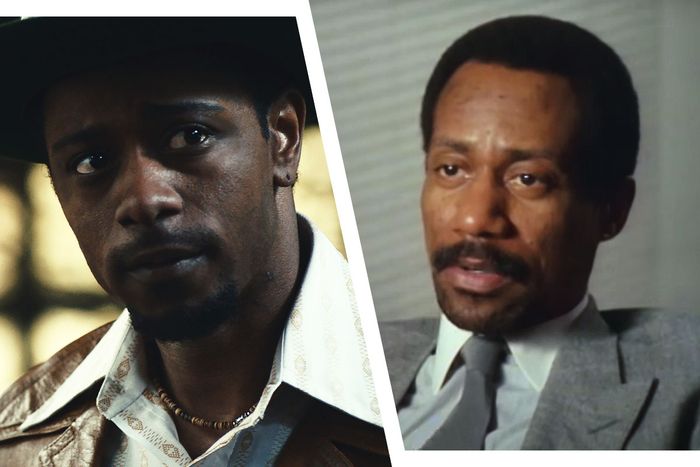
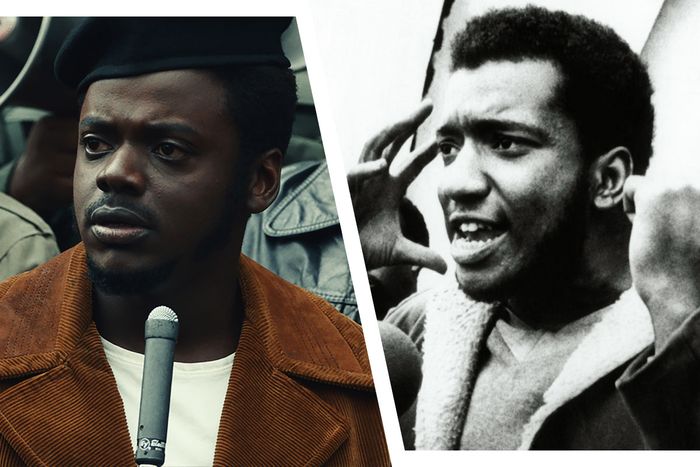
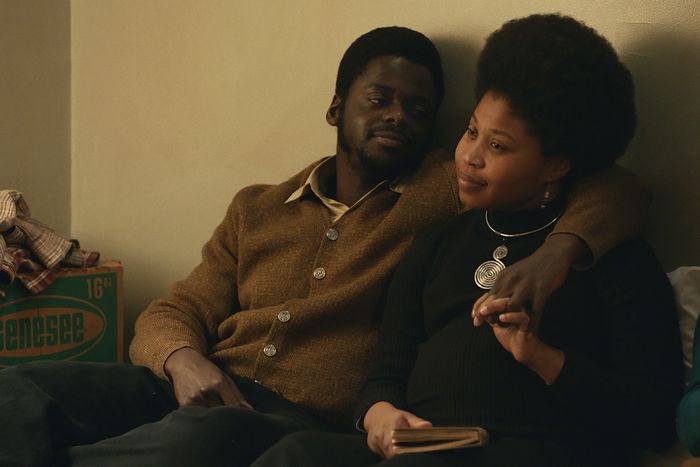
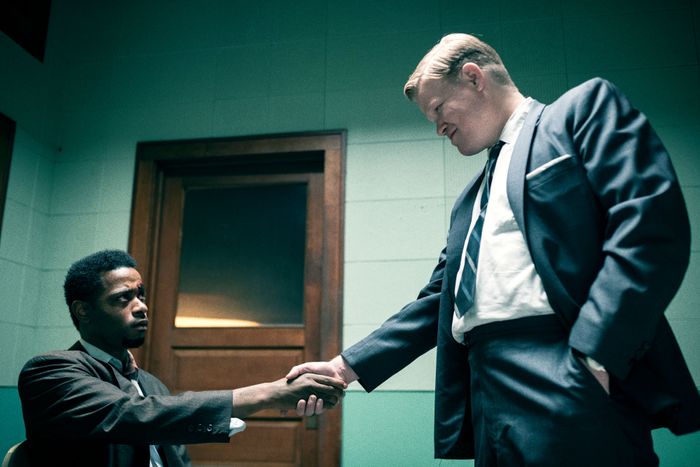
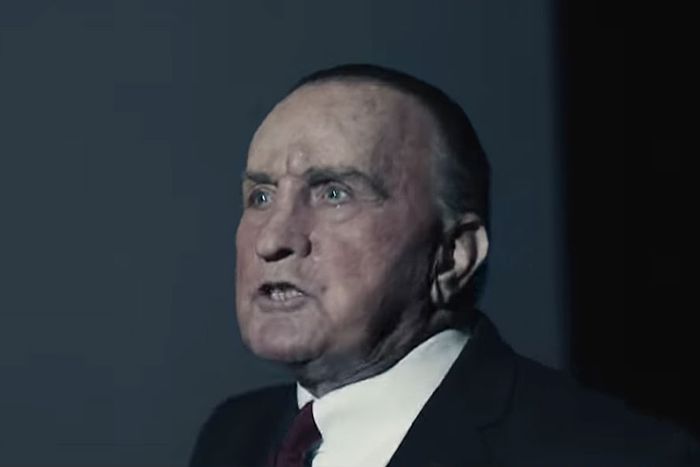















0 Response to "Who’s Who in Judas and the Black Messiah: A Character Guide - Vulture"
Post a Comment